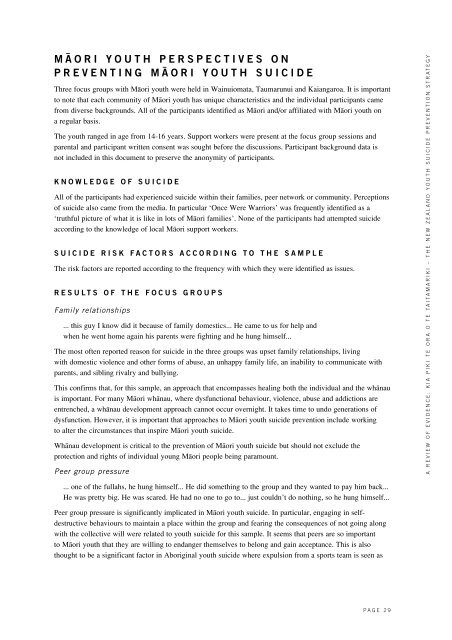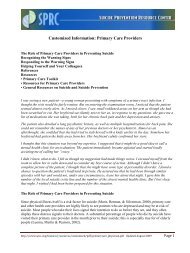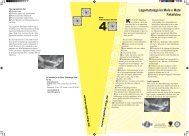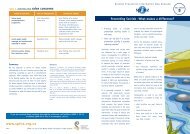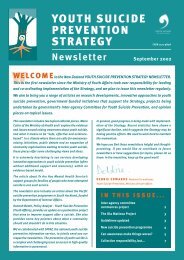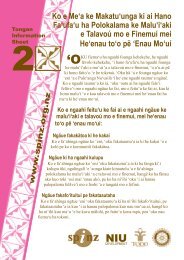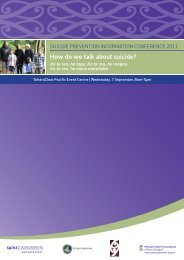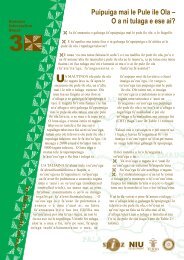A background document to support Kia Piki Te Ora O Te ... - SPINZ
A background document to support Kia Piki Te Ora O Te ... - SPINZ
A background document to support Kia Piki Te Ora O Te ... - SPINZ
You also want an ePaper? Increase the reach of your titles
YUMPU automatically turns print PDFs into web optimized ePapers that Google loves.
M ĀORI YOUTH PERSPECTIVES ON<br />
PREVENTING MĀORI YOUTH SUICIDE<br />
Three focus groups with Mäori youth were held in Wainuiomata, Taumarunui and Kaiangaroa. It is important<br />
<strong>to</strong> note that each community of Mäori youth has unique characteristics and the individual participants came<br />
from diverse <strong>background</strong>s. All of the participants identified as Mäori and/or affiliated with Mäori youth on<br />
a regular basis.<br />
The youth ranged in age from 14-16 years. Support workers were present at the focus group sessions and<br />
parental and participant written consent was sought before the discussions. Participant <strong>background</strong> data is<br />
not included in this <strong>document</strong> <strong>to</strong> preserve the anonymity of participants.<br />
KNOWLEDGE OF SUICIDE<br />
All of the participants had experienced suicide within their families, peer network or community. Perceptions<br />
of suicide also came from the media. In particular ‘Once Were Warriors’ was frequently identified as a<br />
‘truthful picture of what it is like in lots of Mäori families’. None of the participants had attempted suicide<br />
according <strong>to</strong> the knowledge of local Mäori <strong>support</strong> workers.<br />
SUICIDE RISK FACTORS ACCORDING TO THE SAMPLE<br />
The risk fac<strong>to</strong>rs are reported according <strong>to</strong> the frequency with which they were identified as issues.<br />
RESULTS OF THE FOCUS GROUPS<br />
Family relationships<br />
... this guy I know did it because of family domestics... He came <strong>to</strong> us for help and<br />
when he went home again his parents were fighting and he hung himself...<br />
The most often reported reason for suicide in the three groups was upset family relationships, living<br />
with domestic violence and other forms of abuse, an unhappy family life, an inability <strong>to</strong> communicate with<br />
parents, and sibling rivalry and bullying.<br />
This confirms that, for this sample, an approach that encompasses healing both the individual and the whänau<br />
is important. For many Mäori whänau, where dysfunctional behaviour, violence, abuse and addictions are<br />
entrenched, a whänau development approach cannot occur overnight. It takes time <strong>to</strong> undo generations of<br />
dysfunction. However, it is important that approaches <strong>to</strong> Mäori youth suicide prevention include working<br />
<strong>to</strong> alter the circumstances that inspire Mäori youth suicide.<br />
Whänau development is critical <strong>to</strong> the prevention of Mäori youth suicide but should not exclude the<br />
protection and rights of individual young Mäori people being paramount.<br />
Peer group pressure<br />
A REVIEW OF EVIDENCE: KIA PIKI TE ORA O TE TAITAMARIKI – THE NEW ZEALAND YOUTH SUICIDE PREVENTION STRATEGY<br />
... one of the fullahs, he hung himself... He did something <strong>to</strong> the group and they wanted <strong>to</strong> pay him back...<br />
He was pretty big. He was scared. He had no one <strong>to</strong> go <strong>to</strong>... just couldn’t do nothing, so he hung himself...<br />
Peer group pressure is significantly implicated in Mäori youth suicide. In particular, engaging in selfdestructive<br />
behaviours <strong>to</strong> maintain a place within the group and fearing the consequences of not going along<br />
with the collective will were related <strong>to</strong> youth suicide for this sample. It seems that peers are so important<br />
<strong>to</strong> Mäori youth that they are willing <strong>to</strong> endanger themselves <strong>to</strong> belong and gain acceptance. This is also<br />
thought <strong>to</strong> be a significant fac<strong>to</strong>r in Aboriginal youth suicide where expulsion from a sports team is seen as<br />
PAGE 29


